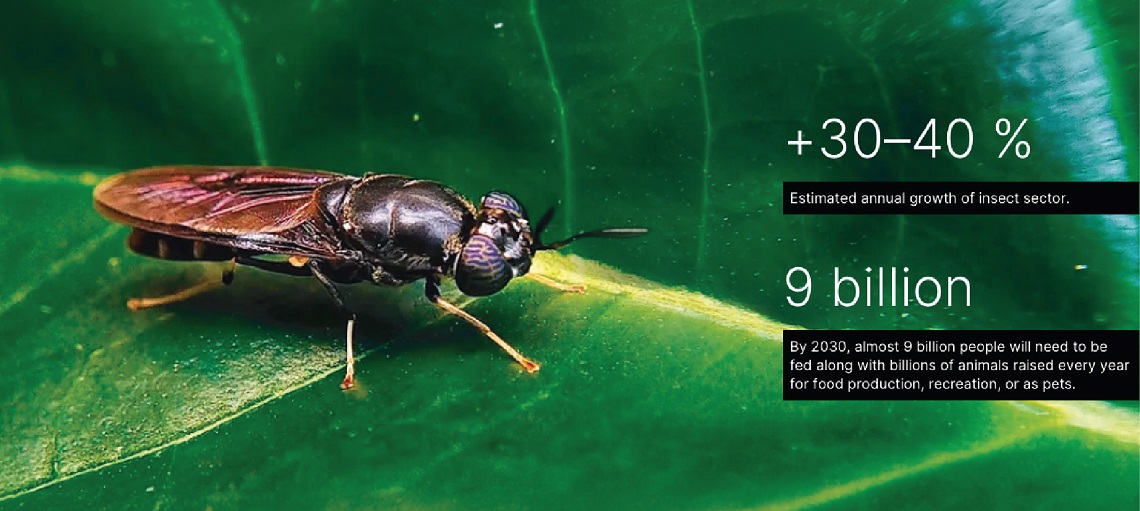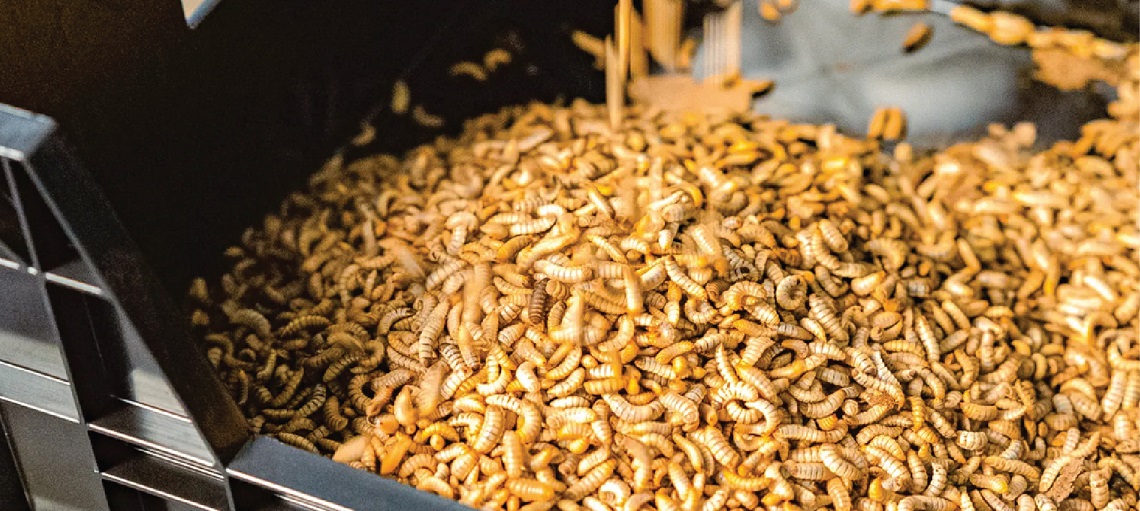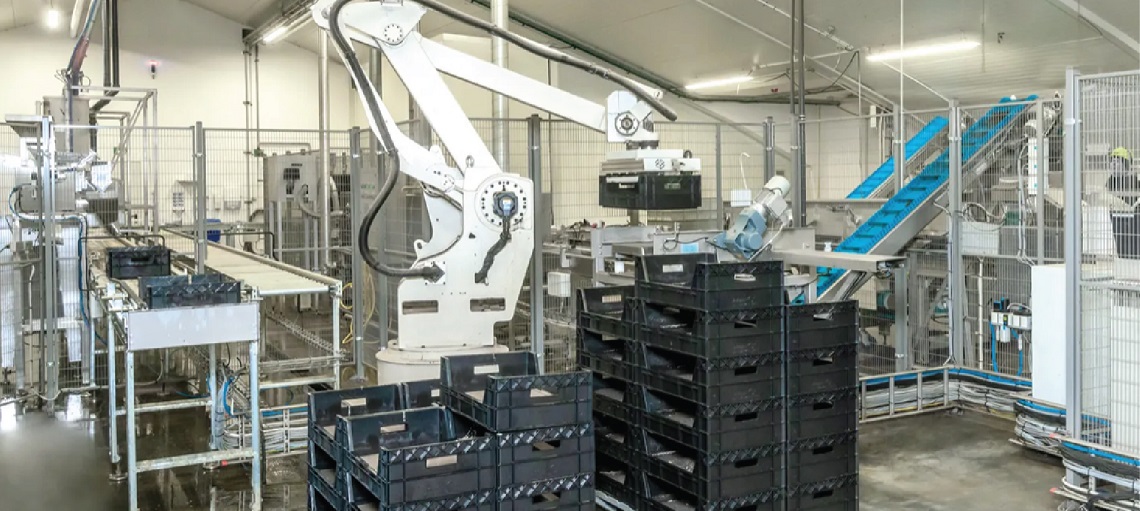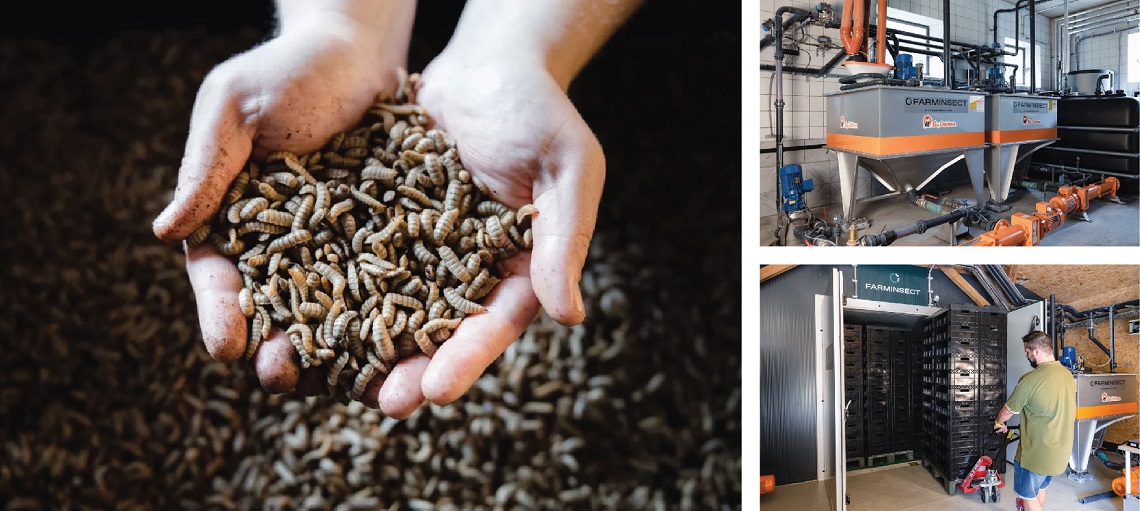Super Fly: Black Soldier Fly Farming for Food, Feed and Future of Agriculture
Black soldier fly (BSF) farming is an appealing, sustainable, and economically promising industry. Its ability to convert organic waste into high-value protein and other products positions it as a key player in the future of sustainable agriculture and waste management. As technology and market acceptance continue to evolve, BSF farming is poised to become a significant component of the global food and feed supply chain.

Though still a small industry with low global production volumes, reports indicate that the insect sector has an annual growth of 30 to 40 percent, which is projected to reach a global production volume of 1,000,000 tons of protein and fat by the year 2030. Better Insect Solutions or BIS, which is a concept and solutions hub of the Big Dutchman group has been active in the insect farming sector since 2020 and sees enormous potential in this sector. Various applications in livestock feed, pet food and even human food is already gaining traction, as well as BSF by-product than can be used as fertiliser or in biogas plants.
BSF is the Go-to Insect in Food and Feed Applications

This game-changing endeavour involves the cultivation of Hermetia illucens, a species known for its remarkable ability to convert organic waste into valuable resources. Unlike other insects, BSFs do not spread diseases and their larvae are incredibly efficient decomposers, making them ideal candidates for waste management and resource recovery. This means that BSFs larvae are able to consume any organic matter including livestock manure, compost, food waste among others and convert them into high quality protein and fats with excellent nutritional value.
The protein content of BSF larvae is incredibly high, making them a viable alternative to traditional protein sources in both human and animal diets. With global populations rising and the demand for protein increasing, BSF larvae present a sustainable solution.
Nutritional Value of BSF Larvae:
- High Protein Content: BSF larvae contain up to 42% protein.
- Rich in Essential Amino Acids: These larvae provide a balanced profile of essential amino acids.
- Healthy Fats: They also offer beneficial fats, including omega-3 and omega-6 fatty acids.
BSF larvae are particularly valuable as feed for livestock, poultry, and fish. Incorporating BSF larvae into animal diets not only enhances the nutritional profile of the feed but also reduces the reliance on traditional feed sources like soy and fishmeal.
Advantages of BSF in Animal Feed:
- Sustainability: BSF larvae can be produced using organic waste, reducing the environmental footprint of feed production.
- Cost-Effectiveness: They are often cheaper to produce than conventional feed ingredients.
- Nutritional Benefits: High protein and fat content support healthy growth in animals.
BSF Farming is High-Performing, Ethical and Zero-Waste

Since BSFs only live for up to 6 weeks, understanding their life cycle and habitat needs is critical. However, BSF larvae farming is a much easier and less intensive process compared to traditional livestock production. A BSF can lay up to 500 eggs at any one time and this multiples from one generation to the next, which means very little is needed to get the hatchery started.
A BSF larvae also eats up to twice of its own body weight every day. The moment the larvae hatches it only takes approximately two weeks to reach harvesting size, making this an efficient process that does not consume too many resources. In fact, BSF larvae only need 1.5 kg of organic matter to produce 1 kg of consumable harvest. When compared to the feed conversion efficiency of poultry, where typically 2.2 kg of feed is required to produce 1 kg of meat, BSF farming evidently high-performing and sustainable.
BSF farming is also a more humane approach to protein production, as the larvae prefer to stay very close together, as opposed to other livestock operations where this is considered unethical. Most importantly, BSF farming produces virtually zero waste as the remains, often referred to as Frass, can be used as fertiliser for direct field application.
The Future of BSF Farming

As we look to the future of agriculture, Black Soldier Fly farming stands out as a promising innovation. The ability of BSFs to convert waste into valuable resources aligns with the principles of a circular economy, where waste is minimised, and resources are continuously reused.
Impact on Global Food Security
- Alternative Protein Source: With the global demand for protein expected to double by 2050, BSF larvae could play a crucial role in meeting this need.
- Reducing Pressure on Fisheries: By providing an alternative to fishmeal, BSF farming can help alleviate overfishing and protect marine ecosystems.
- Supporting Small-Scale Farmers: BSF farming can be implemented on a small scale, providing farmers with an additional source of income and reducing dependency on external feed inputs.
Environmental Benefits
- Lower Carbon Footprint: The production of BSF larvae generates fewer greenhouse gases compared to traditional livestock farming.
- Resource Efficiency: BSF farming utilizes organic waste, turning it into high-value products, thus promoting resource efficiency.
Black Soldier Fly farming represents a revolutionary shift in the way we approach food production and waste management. By harnessing the natural abilities of these insects, we can create a more sustainable and resilient global food chain.
Want to learn more about BSF farming and the opportunities it offers? Click the ‘Send a Message’ Button below to talk to us.

